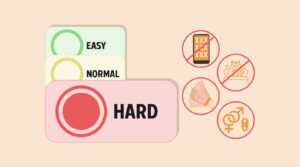At first glance masturbation only minimally affects T levels. While it does cause a small but immediate decline in free testosterone, this dip rebounds quickly in the day (or days) post-orgasm.
These concepts have led many people to discount the idea that masturbation could cause low testosterone or its primary symptoms.
Could there be more to the picture, however? What if masturbation affected T levels differently than sexual intercourse? What if testosterone levels alone didn’t tell the whole story? What if mainstream healthcare has downplayed the possible downsides of frequent masturbation? Let’s take a closer look.
Does masturbation lead to low testosterone?
Testosterone is the primary hormone that gives men what are called secondary sexual characteristics: things like facial hair, a deepened voice, muscular strength, et cetera.
On one hand, the connection between masturbation and testosterone is clear. The higher your sex hormone levels, the higher your sex drive (though estrogen may also contribute to sexual desire). And the higher your sex drive, the more apt you’ll be to seek out sex and/or masturbate.
But this connection is much less clear when cause and effect are reversed. Does masturbation bring testosterone levels back down to a more manageable baseline, or does it actually damage them?
For some men, it just might. and given that so many men report experiencing erectile dysfunction, low libido, and low motivation levels after masturbating, it’s clear that something is going on.
What low testosterone looks like: signs and symptoms
In the absence of formal testing, an easy way to tell if you have low testosterone is by looking at this condition’s known signs and symptoms. If you have more than a couple of the following, you’re probably dealing with low T:
Penile tumescence
In case you’re wondering, penile tumescence just refers to morning wood. Healthy men actually experience up to 5 spontaneous, short-term erections each night, with the last one occurring during the waking hours. This is probably the single biggest indicator of low – or high – testosterone that your body gives you.
Mood problems
Low testosterone can also cause mood problems, including depression, anhedonia, anxiety, and irritability. Some Pubmed studies have recommended TRT as a potential solution for these types of mood problems. [1]
Reduced semen volume
Testosterone plays a vital role in semen volume. In general, more T = more semen (and sperm) being produced. On the flipside, men with low testosterone may notice their semen volume is lower than it used to be.
A reduction in sexual drive
Sexual arousal and drive are also closely mediated by testosterone. (The high T levels experienced by many younger men explain why they’re apt to think about sex all the time.)
Low testosterone levels, on the other hand, can kill your confidence and reduce your incentive to interact with women.
Low muscle mass
Muscle mass and testosterone have a synergistic relationship. The more T you have, the more muscle mass you’ll be able to build…the more muscle mass you have, the more T you’ll be able to produce.
If you’re losing muscle mass despite eating and exercising right, though, watch out. You might be fighting against your body’s declining testosterone levels. Same goes if you’re noticing a loss of strength.
Less facial hair
Testosterone plays a key role in promoting facial hair development. As you might expect, low T can lead to thinning hair, hair loss, and patchy hair. That’s true whether we’re talking about body hair, facial hair, or your hairline.
Infertility
Infertility is one of the most insidious aftereffects of low testosterone. Low T can lead to low sperm counts, which in turn can lead to — you guessed it — an inability to create new life with your partner.
Erectile dysfunction (ED)
Sexual health problems like ED provide a pretty sure sign that your T is too low. Occasional ED might be a sign of stress, sleep deprivation, etc – but be sure to get your testosterone levels checked if this becomes a regular thing.
The hormones behind masturbation, sex, and health
Testosterone is pretty dang important, but it’s not the end-all-be-all. Other hormones are affected by masturbation, too. Among the primary suspects are steroid hormones like estrogen and progesterone:
- Testosterone
- Estrogen
- Progesterone
- Cortisol
- Dopamine
- Oxytocin
- Prolactin
Don’t let the last hormone on this list go unnoticed – it may actually be the most important one of them all when it comes to determining how you feel after masturbating. Studies clearly show that prolactin levels skyrocket after masturbation and ejaculation. This may explain many of the practice’s least desirable aftereffects more than any changes to testosterone.
Other small studies on pubmed.gov studies have found that testosterone levels increase during sexual abstinence, during certain times of the day, and when looking at pictures of sexually attractive people. [2]
Does masturbation impact your sex drive or sexual desire?
For many men, it sure does! While masturbation can lead to a small ‘rebound effect’ in sex drive in the days that follow, it tends to diminish sexual desire in the long run. This effect can also be psychological: if you’re hooked on PMO you might simply be lacking the biological impetus to seek out actual sex.
Masturbation vs. sexual activity: do they impact T levels differently?
More research is needed before we can really understand whether or not masturbation reduces T levels more than sexual intercourse.
that being said, it is fairly clear from the research that masturbation raises prolactin more than sexual activity does. This can lead to a variety of side effects. For one, masturbation causes POIS more than sex does. Other potential side effects include:
- Lower overall androgen levels
- Reduced sexual function
- Reduced well-being
- Hair loss/hair thinning
- Lower testosterone levels
- Reduced confidence
These disparities are a key reason why some men’s health advocates recommend abstaining from masturbation and pursuing meaningful sexual relationships instead.
Other authorities, including more than a few endocrinologists, suggest testosterone replacement therapy.
Does masturbation reduce testosterone levels? Summing things up
Masturbation can and does cause unwanted side effects for some men, but these effects may be more attributable to prolactin than to testosterone.
After all, there are more important things when it comes to maximizing testosterone, including eating right (lots of animal products!), sleeping right (the more the better!), and exercising (preferably with weights). Feel free to look at abstaining from masturbation as the icing on the proverbial cake.
Table of Contents





